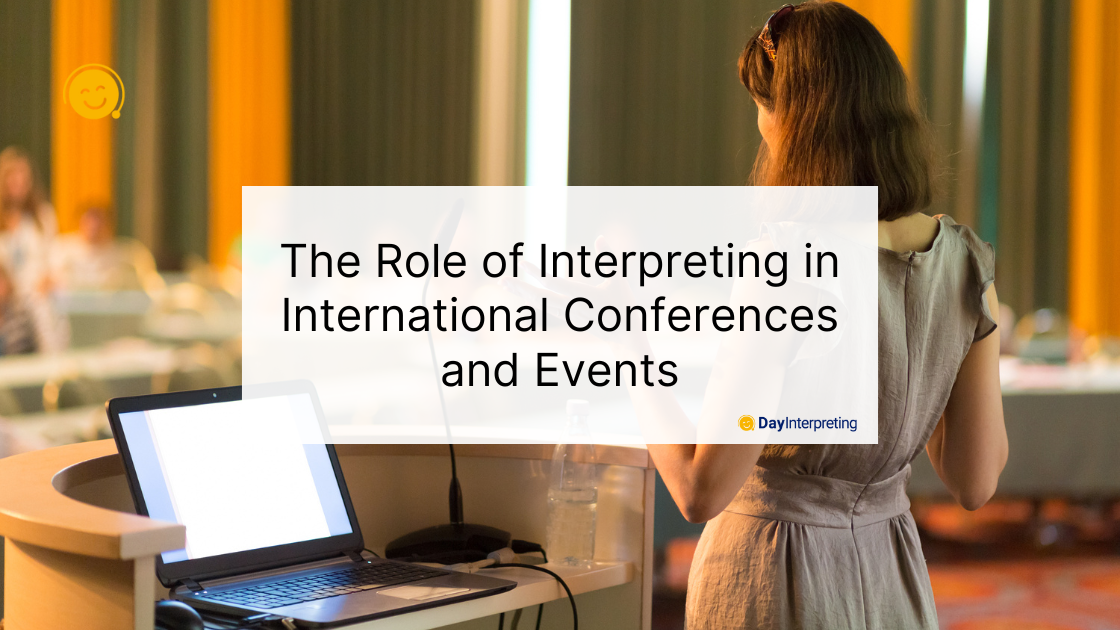In our modern economic climate, international conferences and events serve as vital platforms for global collaboration, knowledge sharing, and cultural exchange. These gatherings bring together individuals from diverse linguistic and cultural backgrounds, necessitating effective communication to bridge the language gap. This is where professional interpreting services play a crucial role. In this article, we will explore the significance of interpreting in international conferences and events, highlighting its benefits and the various interpreting modalities employed.
The Significance of Interpreting in International Conferences
Interpreting Facilitates Multilingual Communication
One of the primary roles of interpreting in international conferences and events is to facilitate multilingual communication. As participants often come from different countries, with diverse language preferences, effective communication is essential for meaningful interactions. Interpreters serve as language mediators, enabling speakers to deliver their messages in their native language while ensuring that participants who speak different languages can understand and engage with the content.
Professional Interpreters Ensure Accuracy and Clarity
Interpreters are trained professionals who possess excellent language skills and cultural knowledge. They are adept at accurately conveying the intended message while maintaining clarity and precision. They carefully listen to the speaker’s words, interpret them in real-time, and deliver the message to the target audience using appropriate linguistic and cultural nuances. This ensures that the content is accurately transmitted, preventing any miscommunication or misunderstanding that may arise due to language barriers.
Conference Interpreting Services Promote Inclusivity and Participation
By providing conference interpreting services, conferences and events become inclusive platforms that encourage participation from individuals regardless of their language backgrounds. Interpreters enable attendees to fully engage in discussions, presentations, and networking opportunities, thereby breaking down language barriers. This inclusivity fosters collaboration, promotes diversity, and allows for a more comprehensive exchange of ideas, ultimately enriching the conference experience for all participants.
Linguistic Services Cater to Different Interpreting Modalities
Conference interpreting at international conferences and events can be delivered through various modalities, depending on the nature and scale of the event. The most common interpreting modalities include:
Simultaneous Interpreting
Simultaneous interpretation involves conference interpreters working in soundproof booths, listening to the speaker through headphones, and delivering the interpretation in real-time via microphone in the target language. This modality allows for uninterrupted communication and is ideal for large-scale conferences with multiple target language audience members.
Consecutive Interpreting
In consecutive interpreting, conference interpreters listen to a portion of the speaker’s spoken language and then deliver the interpretation while the speaker pauses. This modality is suitable for smaller events, workshops, or bilateral meetings where interpretation is required for shorter segments, but it can also be used to facilitate a successful international event.
Whispered Interpreting (Chuchotage)
Whispered interpreting involves a conference interpreter providing simultaneous interpretation to a small number of individuals or a single person that speaks a foreign language. This modality is useful in situations where only a few participants require interpretation and is often employed during meetings, tours, or informal settings.
Remote Interpreting
With advancements in technology, remote interpreting has gained popularity. This modality allows a conference interpreter to provide their services from a remote location via video or audio connections. Remote interpreting reduces logistical challenges, facilitates access to interpreters in various time zones, and is particularly useful in virtual conferences and events.
It Assists You in Maintaining Professionalism and Confidentiality
Professional interpreting services ensure the highest level of professionalism and confidentiality. Interpreters adhere to a strict code of ethics, which includes principles of impartiality, accuracy, and confidentiality. A conference interpreter handles sensitive information and discussions with utmost discretion, maintaining the trust and confidence of the participants. This commitment to professionalism creates a secure environment for open dialogue and allows participants to communicate freely.
Interpretation Services Enhances the Event’s Reputation and Impact
Quality interpreting services contribute to the overall success and reputation of international conferences and events. When participants can communicate effectively in their preferred language, they are more likely to have a positive experience and derive greater value from the event. This, in turn, leads to increased participant satisfaction, stronger networking opportunities, and a higher likelihood of return attendance. A well-organized event with seamless multilingual communication enhances the event’s impact and elevates its standing within the global community.
Conclusion
The role of interpreting in international conferences and events cannot be overstated. Interpreters serve as language facilitators, ensuring accurate and clear communication, promoting inclusivity, and enabling participants to engage fully in discussions and networking opportunities. With different interpreting modalities available, professional interpreters deliver their services while upholding the highest standards of professionalism and confidentiality. By investing in quality interpreting services, conference organizers enhance the reputation and impact of their events, creating an environment that fosters collaboration, knowledge sharing, and cultural exchange on a global scale.





0 Comments